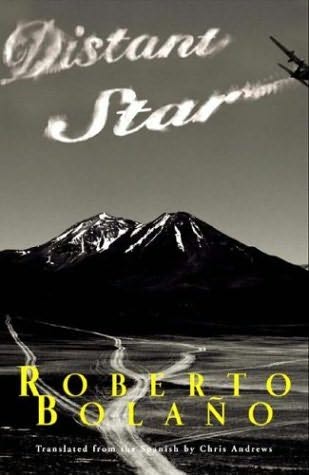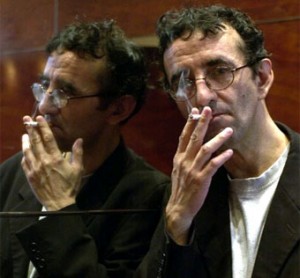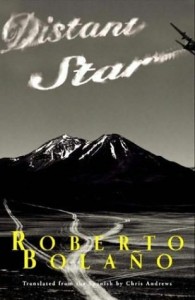
I started reading Roberto Bolaño’s novel Distant Star at Denver International Airport, where we waited three hours for the first leg of our flight to Cancún. Thunderstorms over Dallas had grounded flights there, where we were supposed to connect, so I started out with an overhanging mood of distress, uncertainty, and not too far below the surface, anger—at the weather, the airline, and the idiocy of my choosing a connecting flight to save a few bucks. As it turned out, this mood was somewhat similar to that of Bolaño’s book, falling short only in the mortal dread and mordant humor departments.
Distant Star concerns the fate of a group of students in a Chilean poetry workshop on the eve of the 1973 U.S.-sponsored coup against that country’s president, Salvador Allende, which resulted in his death and the elevation to power of the craven dictator Augusto Pinochet, a creature of the CIA and Henry Kissinger. The novel is essentially a black comedy about one of those students, Alberto Ruiz-Tagle, whom the coup catapults into prominence as the prime example of the New Chilean Poetry. We know from the get-go that Alberto Ruiz-Tagle is the pseudonym of a shadowy figure named Carlos Wieder, who—to put it mildly—ends up with blood on his hands. Blood and poetry, I would say, except that the poetry is not on his hands but scrawled upon the Chilean skies using a skywriting plane piloted by the poet himself. The performance earns Wieder/Ruiz-Tagle an immediate following, especially among the country’s new military rulers, and the novel tracks his career as a poetic analog to the descent of Chile into repression and barbarism.
If this doesn’t sound funny it’s because it isn’t, in the “ha-ha” sense of the word (although there are plenty of comic moments, beautifully captured in Chris Andrews‘ subtle translation); it’s funny in the “peculiar” sense—and one laughs more often than not out of something akin to panic. The history is there: we know about the mass-murder, the torture, kidnappings, illegal detentions, and the forced disappearances, and we know about the political corruption and illegal enrichment of Pinochet’s family. We know that the demented 91-year-old Pinochet—living under house arrest in Chile after being charged with crimes of murder and torture—finally died of congestive heart failure in December 2006. A coward’s death, surely, since in death he avoided being convicted for his crimes. If that isn’t black comedy, I don’t know what is.
All this is deep background for Bolaño, though. His novel is tightly focused on the personal, on the way persons create history. Wieder/Ruiz-Tagle has a Pinochet moment of sorts, but off stage—and there is no satisfaction in it. “A dreadful business” our unnamed narrator calls it. He’s right, especially because he himself had been drawn into it. But more dreadful are the sufferings inflicted on a group of idealistic young poets for reasons both pathological and aesthetic. The politics, in the novel as in life, are secondary.
 I won’t go into the winding path that led me to read parts of Distant Star in Dallas, Mexico City, and Cancún, only to finish it suspended in a hammock at a seaside hotel near Playa del Carmen. My peripatetic reading of the book mirrored in miniature the far-flung travels of the narrator, himself a poet, who attains his own kind of wisdom. “This is my last communiqué from the planet of the monsters,” he tells us in the penultimate chapter. “Never again will I immerse myself in literature’s bottomless cesspools. I will go back to writing my poems, such as they are, find a job to keep body and soul together, and make no attempt to be published.” He doesn’t speak for Bolaño, of course, who assiduously sought publication, and he doesn’t speak for me—most days. But there is something authentic and appealing in his decision to live a divided life, with poetry in one place and the audience in another, on the other side of yet another “dreadful business.”
I won’t go into the winding path that led me to read parts of Distant Star in Dallas, Mexico City, and Cancún, only to finish it suspended in a hammock at a seaside hotel near Playa del Carmen. My peripatetic reading of the book mirrored in miniature the far-flung travels of the narrator, himself a poet, who attains his own kind of wisdom. “This is my last communiqué from the planet of the monsters,” he tells us in the penultimate chapter. “Never again will I immerse myself in literature’s bottomless cesspools. I will go back to writing my poems, such as they are, find a job to keep body and soul together, and make no attempt to be published.” He doesn’t speak for Bolaño, of course, who assiduously sought publication, and he doesn’t speak for me—most days. But there is something authentic and appealing in his decision to live a divided life, with poetry in one place and the audience in another, on the other side of yet another “dreadful business.”
I sat with Distant Star a long time after finishing it, staring out to sea. The turquoise and silver waves were roaring shoreward, turning to sparkling froth the closer they came, driven by the warmish wind that made the palm trees my hammock was tied between stir and creak. I’d had a similar feeling after finishing Bolaño’s massive masterpiece 2666—a kind of dreamy strangeness, as if I were standing on a swaying threshold, with no safe haven before or behind. It’s not exactly a pleasant feeling, but it feels real and vaguely thrilling. And nobody I can think of delivers this particular reality like Bolaño.
I couldn’t know in that hammocked moment that Distant Star and the next book I happened to pick up, Nicanor Parra’s After-Dinner Declarations, would interpenetrate in surprising ways. But more on that in my next Mexico Books 2009 post.


 Joseph Hutchison, Colorado Poet Laureate 2014-2019, has published 20 collections of poems and edited or co-edited three poetry anthologies. He currently directs two master’s-level programs for University College at the University of Denver: Professional Creative Writing and Arts & Culture Management. Joe lives with his wife, Melody Madonna, in the mountains southwest of Denver, Colorado, the city where he was born.
Joseph Hutchison, Colorado Poet Laureate 2014-2019, has published 20 collections of poems and edited or co-edited three poetry anthologies. He currently directs two master’s-level programs for University College at the University of Denver: Professional Creative Writing and Arts & Culture Management. Joe lives with his wife, Melody Madonna, in the mountains southwest of Denver, Colorado, the city where he was born. 









